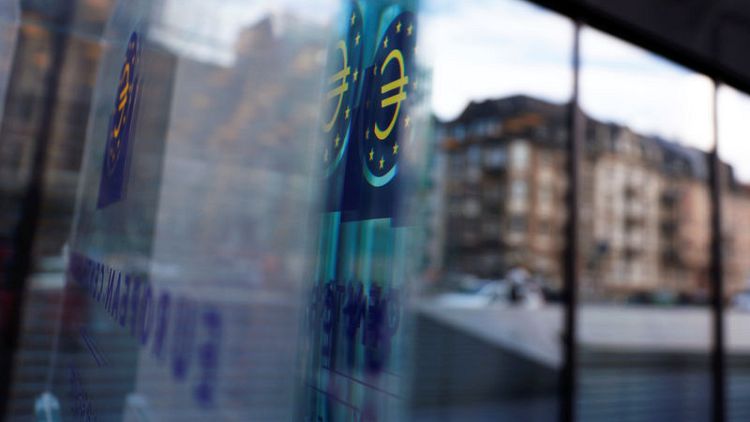By Shrutee Sarkar
BENGALURU (Reuters) - The European Central Bank will delay any interest rate hikes further into next year than previously thought as euro zone economic growth and inflation prospects have dimmed, a Reuters poll of economists showed.
That change comes only a few months after the central bank shut its monthly asset purchases, known as quantitative easing (QE), and March's offer of new long-term loans, or TLTROs, to start in September.
It is not very different elsewhere in the world, with growth in most major economies predicted to slow and central banks, including the U.S. Federal Reserve, expected to hold off on policy tightening.
The ECB is already on its longest break from changing rates and this week's poll of more than 80 economists showed the central bank will delay any tightening even further.
"To some extent, the ECB's concerns are understandable as its toolbox is empty. Of course, when push comes to shove, the ECB could restart QE. They could even follow the BoJ in its footsteps, buying equities at some point," said Elwin de Groot, head of macro strategy at Rabobank.
"But after massive QE, negative deposit rates and strong forward guidance, core inflation for March still stood just 0.2 percent shy of its all-time low. So the ECB may well prove to be relatively powerless."
The poll showed the ECB is expected to lift interest rates later next year, but inflation was forecast to remain below the Bank's target of just under 2 percent for at least the next three years.
Inflation was forecast to average 1.4 percent in 2019, 1.5 percent in 2020 and 1.6 percent in 2021, broadly unchanged from last month.
"The ECB cannot increase rates just yet, simply because inflation is too weak. They will continue to reinvest everything that comes to maturity in their asset portfolio at least until 2021," said Julien Manceaux, senior economist at ING.
The consensus was for the euro zone economy to grow between 0.2 and 0.4 percent each quarter through to the end of next year, a slight downgrade from last month. One contributor forecast outright contraction next year.
Twenty-nineteen and 2020 growth outlooks for big euro zone economies were downgraded or at best left unchanged in the latest poll compared with the January poll.
Still, the ECB is forecast to raise its deposit rate by 10 basis points to -0.30 percent in the third quarter of 2020, according to the consensus, compared with a second quarter hike expected in the previous poll.
But whether the first rate hike comes in the third or fourth quarter was on a knife edge.
Of economists with a view that far out, 51 percent predicted rates to have risen by the end of the third quarter next year and over 55 percent expect it by end-2020.
The refinancing rate was forecast to remain on hold at zero through to the end of next year at least. Last month, a hike was expected at the end of next year.
This latest poll was also the first since 2016 when any respondent has forecast the deposit rate would be cut further. That call echoes eonia money market futures, which have priced in a small chance of a rate cut this year.
"We think a U.S. recession in 2020 will prevent any further normalisation moves and instead push the ECB to more accommodative monetary policy in September 2020," noted Michel Martinez, chief economist for Europe at Societe Generale.
But over 65 percent of economists who answered an additional question said they were confident the euro zone economy would recover significantly from its current downturn. The remaining said they were not.
The median probability of a recession in the euro zone was unchanged at 20 percent in the next 12 months and 30 percent in the next two years.
"Both the ECB and the Fed have turned incrementally more dovish. If all else were to remain constant, this should provide support to the economy and risk assets," noted Ajay Rajadhyaksha, head of macro research at Barclays.
(Additional reporting by Richa Rebello, polling by Sarmista Sen, Manjul Paul and Sumanto Mondal)



